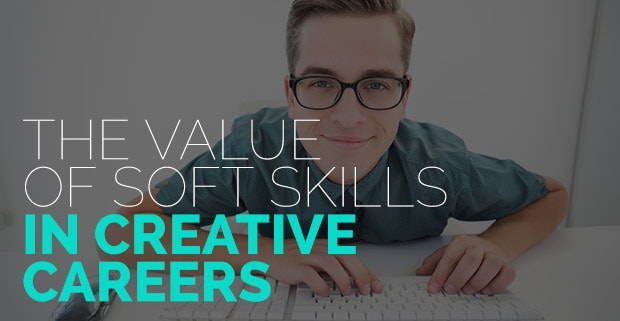 Image of young man with glasses from Shutterstock.
Image of young man with glasses from Shutterstock.
Developing one’s soft skills, particularly in creative fields that often require a holistic expertise, can help develop your career whether you’re a novice intern, a motivated employee or an experienced manager. Laura Burton-Bloom delves into her top three.
Soft skills are intangible skills associated with a person’s personality and their ability to emotionally relate to those around them. However, the value of soft skills is frequently downplayed; hiring managers make the assumption that people “just know” how to behave, cope and survive the working environment. Not so. There’s a list of soft skills floating around someplace, and it lists over 80 of them (!) – the three listed below are a good starting point.
Self-Confidence
It’s easy to let uncertainty define our approach to the world, especially when we’re just starting out. We look at the art that inspires us and are all but overwhelmed at the technical prowess and creative depth needed to achieve it. But as renowned novelist Haruki Murakami writes, “everybody has to start somewhere. You have your whole future ahead of you. Perfection doesn’t happen right away.” No one has the luxury of waiting until they have all the knowledge necessary to be an instant success in their field. The only way to move forward in creative industries is by jumping in, and the only way to jump in is by believing in yourself.
Takeaway: fake it ‘til you make it.
Harvard researcher Amy Cuddy says that when you pretend to be powerful, you actually feel powerful. When you visualize the type of career you want, or the artist you want to be, act as if you’re already there. “Faking it until you make it” gives you the confidence to put yourself in situations where you can develop lucrative relationships and encounter meaningful opportunities. Then, find one area of expertise that you are already strong in, such as your natural intelligence, curiosity or willingness to learn, and promote it.
Having confidence in something (anything!) about yourself can help fill in the gaps while you work to hone your technical craft.
Humour
Working in a creative field is a high calling. The demands of a rapidly evolving industry can be hard. You’re challenged on all sides to be innovative, creative and hard-working. Art itself asks a lot of the individual. We pour our souls into our projects and have the whole artistic history of the human race to compare ourselves to. It’s a heavy burden.
But, if we’re perfectly honest, art can also be completely ridiculous. Whether it’s scripting a drunken Orc or writing zany marketing copy we’ve all come up against the ways that art, while important, isn’t ever literally life or death.
Takeaway: ‘tis better to laugh than cry.
With this in mind, it’s important to maintain perspective and let a little humour into your work life, even in the midst of looming deadlines. Having a sense of humour can help you sustain the energy to keep going on your projects until the end without getting burned out. It’s also a great tool for influencing others. It creates a productive, engaged atmosphere that inspires your coworkers to do their best work.
Leadership
Leadership isn’t just about relaying orders and chastising mistakes. Businesswoman and noted public speaker Susan Colantuono explains leadership as “using the greatness in you to achieve and sustain extraordinary outcomes by engaging the greatness in others.” Effective leadership involves tactful communication, openness to feedback and the ability to resolve conflicts with patience and positivity.
Takeaway: Be the example.
Developing this skill is essential to maintaining team morale, especially within the often volatile creative industry. It gives those around you the confidence to keep striving for their goals even when the chips are down. This is especially true when working with a young or inexperienced staff. Guiding through example while making an effort to note your employees’ strengths rather than their weaknesses creates a solid foundation upon which both emerging and established enterprises can grow.
Laura is McGill University graduate and professional writer from Montreal. She recently launched my own copywriting and digital marketing business.